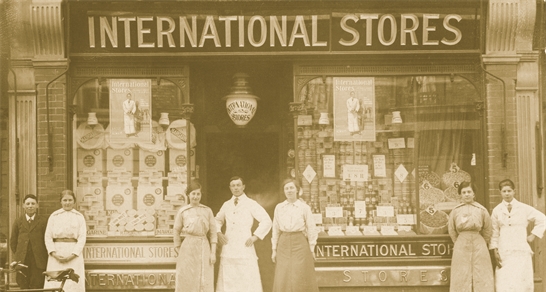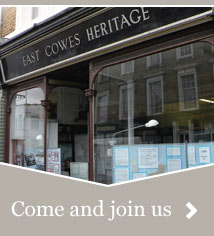About the Isle of Wight Society
The Society was formed in 1969 by concerned residents in response to poor planning decisions, unsympathetic architectural design and mediocre construction of new developments. The Isle of Wight Society is an amenity and conservation organisation, registered with the Charity Commission, number 276986, and affiliated to the national organisation Civic Voice. Our Constitution states that the Objects are: - 1. To stimulate public interest in the Isle of Wight. 2. To promote high standards of planning and architecture in or effecting the Isle of Wight. 3. To secure the preservation, protection, development and improvement of features of historic or public interest in the Isle of Wight. On the 19th of February 1969 representatives of eleven local organisations and branches of national organisations adopted a proposal to form The Isle of Wight Society. On the 9th May 1969 the first public meeting was held at County Hall, Newport. On 6th June the first General Meeting was held and a Chairman, Secretary and Treasurer were elected. Initially meetings were held only in Newport. Planning applications were an immediate agenda item. The need rapidly arose for representatives of the different communities around the Island. Several of these representatives became Chairmen of local groups who held their own meetings and sent representatives to Executive Meetings. That pattern remains in 2013 with the Executive holding monthly meetings at East Cowes Heritage Centre. The number of Groups around the Island has varied over the years. In 2012 the only Groups holding monthly meetings are the Cowes and East Cowes Groups although there are members living in all parts of the Island. The other groups ceased holding monthly meetings due to the difficulty in finding members to take up positions as officers of the Groups and a decline in membership. When the reasons for this decline were analysed it was concluded that the advent of home computers and the internet allowed most individuals to monitor planning applications in their own neighbourhood and make their own representations on-line from their homes. The meetings became merely an evenings entertainment provided by a guest speaker and a small business section. In 2012 we created this website. The aim is to allow members to have easy access to news and information gleaned by the Executive through the Current Topics page. Members can then join in debate by sending emails to our website shown on the Contact Us page. The gist of these and comment from the Executive will then be posted on the Discussion page. As we wish to continue to provide a service for members who do not use the internet a Newsletter will be created twice a year. Hard copies will be distributed to those members who do not have an email address. The Newsletter will also be accessible on the Newsletter page. In order to gain publicity for our activities we shall continue to maintain our annual Conservation Awards scheme that has been in existence since 1973. Five years ago the Island Branch of the Royal Institute of British Architects joined us in presenting their New Build award at the same event. This has become the main public function in our annual diary. Information about the scheme and a nomination form can be found on the Awards page. As you can see from Object number three in our Constitution, the Society is interested in local history. In support of this, members of the East Cowes Group set up the East Cowes Heritage Centre in 1992. This has become a valuable amenity to the community. It also provides a public access point for the Society and is the Society's official address as indicated in the Contact page. The East Cowes Heritage Centre is open most of the year. A permanent display gives visitors a brief introduction to the town. There is an annual programme of exhibitions on local topics including anniversaries of nationally important events that have taken place in the community. It also provides a research centre for everyone through the library of over a hundred files on local topics covered by past exhibitions. We regularly receive requests for information from people studying their family history. If there are answers we do not know, we are in touch with several other organisations around the Island that might be able to help. Further information on opening times and exhibitions is available in the East Cowes Heritage page. In order to clarify the views of the Society, the Executive Committee have developed certain policies. Isle of Wight Society Policies We believe that good architecture sits comfortably with its neighbours. New Development The Society welcomes developers who wish to create employment opportunities on the Island. We also welcome developers who wish to invest in communities by developing new or enhancing existing properties. This encouragement is conditional and offered so long as the developments are sympathetic to their surroundings and the developers wish to have long-term active presence in that community. We do not support Mainland or Island developers who build properties intended solely as second homes that are likely to remain empty for long periods. The Alternative Energy Policy From the information we have received so far, the Isle of Wight Society believes that we should start using alternative sources of energy as soon as possible. We favour those sources that meet the requirements of transportability, storability and predictability. Biomass, biofuels, geothermal heat, solar energy and tidal power are the ones that meet most of the requirements. While we are in favour of developing alternative sources of energy we do not support applications that have an excessive and intrusive visual, noise, vibration or traffic impact on a local community. We believe that any planning approval should contain conditions that if a development does not perform satisfactorily or comes to the end of its useful life all the equipment including ground-works must be removed at the developer and/or landowner's cost. Wind Turbines These installations should not be detrimental to the visual environment. If the expected output advertised by the developers is not met within five years the installation should be removed at the cost of the developer or, if the developer does not have the necessary funds, by the landowner. At the end of its working life the whole of the wind turbine including all the foundations must be removed at the cost of the developer or landowner at that time. Powers of the Executive When the first officers drafted the constitution,based on recommendations of the Civic Trust, they catered for a wide ranging interest in the Island as a whole. So they gave the Society powers to engage in a variety of activities. a) To promote research into subjects directly connected with the objects of the Society and to publish the results of any such research. b) To act as a co-ordinating body and to co-operate with the local authorities, planning committees, and all the statutory authorities, voluntary organisations, charities and persons having aims similar to those of the Society. c)To promote or assist in promoting activities of a charitable nature throughout the Isle of Wight. d) To publish papers, reports and other literature. e) To make surveys and prepare maps and plans and collect information in relation to any place, erection or building of beauty or historic interest within the Isle of Wight. f) To hold meetings, lectures and exhibitions g) To educate public opinion and to give advice and information. h) To raise funds and to invite and receive contributions from any person or persons whatsoever by way of subscription, donation and otherwise; provided that the Society shall not undertake any permanent trading activities in raising funds for its primary purpose. j) To take and accept any gifts of property, whether subject to any special trusts or not. k) To sell, let, mortgage, dispose of or turn to account all or any of the property or funds of the Society as shall be necessary. To borrow or raise money for the purposes of the Society on such terms and on such security as the Executive Committee shall think fit, but so that the liability of individual members of the Society shall in no case extend beyond the amount of their respective annual subscriptions. To do all such other things as are necessary for the attainment of the said purposes. Achievements The Newport Group restored the Blue Jenny memorial to a girls home. The East Cowes Group installed information panels around the town The Ryde Group presented a memorial notice to commemorate the Ryde airport. Members have written books about the history of the Island that are sold at the Heritage Centre.


